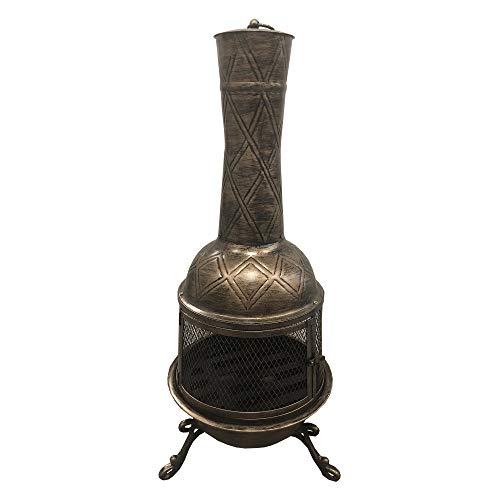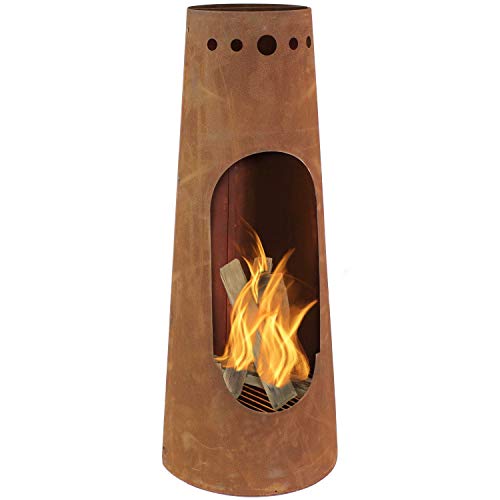5 Killer Quora Answers On Chimineas Sale
페이지 정보
작성자 Bernie Dumaresq 댓글 0건 조회 31회 작성일 24-09-20 13:29본문
 Things You Should Know Before Buying a Chiminea
Things You Should Know Before Buying a ChimineaChimineas are a great addition to your backyard. They can provide warmth and ambience. There are a few things you should think about before purchasing one.
Certain chimineas, like emit harmful particles into the air. To avoid this, you can use bioethanol fire pits. They also require regular maintenance.
The History of the Chiminea
Chimineas are a popular option for outdoor living spaces, warming them up and emitting the warm warmth of an open flame. They can turn the cold summer evening into a cozy spot for entertaining friends and family or just relaxing. The first chimineas were made of clay and other materials, chimineas have evolved to accommodate various aesthetic and functional requirements over the centuries.
The most common chimineas are a potbelly shape and a chimney, however they also come in modern styles that have a more open design. They are typically raised off the ground by the base, and have a large chiminea opening to add firewood. Some chimineas are plain and others are decorated with or raised specifics.
The first chimineas, made from large clay chimineas for sale that was fired, were used for heating and cooking. As these structures became more popular they were modified to accommodate different climates. Improvements in design and construction techniques made them more durable. Chimineas today are made of a variety of metals, stones, and clays, each with distinct aesthetic and practical benefits.
Depending on the kind of chiminea that you select, it may require regular maintenance to ensure it is in good shape. Chimineas made of clay, for instance are susceptible to cracking over time if not properly stored during the winter. Use a specific clay sealant and apply it every 3 to 6 months for the best protection.
Metal chimineas are susceptible to damage but they are still susceptible to cracking if they are not stored correctly. Store them under a cover which will shield them from the elements, like snow and rain. Also, ensure that any chimineas are placed on a level and stable surface to prevent it from toppling over. It is not recommended to place it under trees or over any other structures like the roof of a patio.
In the end, chimineas should be installed permanently in the desired spot and not moved too often because they are very heavy and difficult to move. However, it is easy to move small clay chimineas around different areas of your garden or yard.
Their Functionality
These fireplaces for outdoor use were originally designed as cooking vessels for the Mexican tribes who resided in towns. They are perfect to create a cozy ambience. They can also be used to heat homes by dispersing heat through their chimney system. Apart from that their aesthetic versatility, they allow them to fit into a variety of design styles.
Chimineas are also easy to maintain and manage, which decreases the need for regular maintenance. They also last for longer provided they are maintained properly and protected from extreme weather conditions. The quality of materials and maintenance techniques employed by homeowners will determine the longevity of these products.
Chimineas are available in a variety of materials, including traditional clay as well as steel and cast iron each of which has distinct aesthetics and durability. The latter, for example are more polished and refined appearance that is suitable for modern designs. They also hold heat extremely well which enhances their functionality as outdoor heating. Additionally, some are constructed of eco-friendly materials, providing an alternative to the reliance on fossil fuels.
The daily impact of Chimineas on air quality depends on factors like the duration of use, the kind and amount of moisture in the wood as and the effectiveness of the design. However, these devices emit particles that can be harmful to human health and contribute to the pollution of the air and causing climate change. This can be mitigated by using dry, seasoned wood and an efficient chiminea.
In contrast to fire pits, which offer a wide and astonishing experience, chimineas feature enclosed structures that reduce the production of smoke. They are also designed so that smoke is directed upwards, thereby reducing the risk of health issues and nuisances for neighbors. The open fire pits can cause a lot of smoke that could affect living spaces.
Ultimately, the choice between a chiminea and a fire pit comes down to personal preference, functionality and budget. Both units are versatile and have a distinctive design and design, but chimineas are ideal choice for those looking to create a cosy atmosphere with minimal effort. Due to their specialised design they are easy to handle once heated up, making them an alternative to outdoor fire places.
Materials
Chimineas are available in a variety of styles to suit every taste. They typically have the base of a potbelly which tapers into a chimney and are designed in either clay, steel or cast aluminium chiminea iron. They can be incorporated into the decor of an outdoor deck or patio and are extremely useful. They can create illumination and ambience while providing warmth, which allows you to spend more time outdoors. Chimineas can be utilized instead of fire pits since they are more appealing and better at directing smoke away from people sitting around them.
Clay chimineas can be made by hand, using local, raw clay. The chimineas are then fired to remove any excess material and form a hard, durable surface that is resistant to water. They are then sprayed with a protective glaze to lessen the chance of cracking and warping. Chiminesas can be stored outside year-round, except in bad weather. If it is stored outside, the clay should be covered and protected with the chiminea.
Made of clay, metal or cast iron, a chiminea can give a stylish, rustic design to your patio. They can withstand high temperatures and are ideal for cooking. They are available in various sizes. Some are even equipped with a removable BBQ grill.
Make sure you check that the chiminea is safe for use and has adequate ventilation before you purchase one. It is important that you place it on a non-flammable surface, such as concrete patios or bricks. It should never be placed under an overhang like pergolas or roofs. It is also crucial not to use water to extinguish the flames because the sudden change in temperature can damage terracotta and clay and can also harm metal.
Chimineas are built to be able to withstand temperatures in the outdoors, they should be gradually built up, beginning with small fires and increasing the size of the fire gradually. It is also a good idea to regularly clean your biggest chiminea with an outdoor wood cleaner to avoid ash buildup and rust.
Environmental Impact
Chimineas are well-known for adding warmth and ambiance to outdoor living spaces. However, there is concern that their use creates harmful gases. Carbon monoxide is released when wood is burned in the chimineas. The gas that is a danger has no smell or colour and can cause respiratory problems and other medical health issues.
These gases can build up within enclosed structures such as Chimineas and eventually reach toxic levels. It can cause carbon monoxide poisoning, which can cause unconsciousness or death. It is also a significant source of global warming and air pollution which is why it is important to keep chimineas sale (published on Engtech) outdoors and away from anything flammable.
In addition to carbon monoxide, chimneys can emit particulate matter and other harmful pollutants. The size of the chimney as well as the kind of fuel used play an important role in this and dry wood fuels producing less emissions than wet logs. Using a chiminea that has an arrestor for sparks will reduce smoke and PM2.5 emissions.
Although chimineas have evolved throughout the years however their classic design- a pot-belly base and an elongated chimneyremains the same. This balance of innovation, preservation and aesthetics is what has made chimineas so popular in Europe and beyond.
Chimineas today come in a wide variety of styles and materials that can match almost any garden style. While clay chimineas are still popular, a lot of people prefer metal versions that offer greater durability and weather resistance. They are constructed in cast iron or cast aluminum, and even stainless steel and can be formed in a variety of styles to meet different preferences.
If you're looking for modern appearance, there are also more linear and slim designs that don't compromise the function. But, it's crucial to keep in mind that a chiminea made from metal will require more frequent maintenance and care than a clay model since it will be exposed to thermal shock each time you turn it on.
When choosing a chiminea, it is recommended to study the manufacturer's guidelines carefully before igniting an fire. It is also recommended to cover your chiminea in order to avoid dust and water damage. It is also essential to keep your chiminea clean and clear any ash prior to building an entirely new fire.

댓글목록
등록된 댓글이 없습니다.